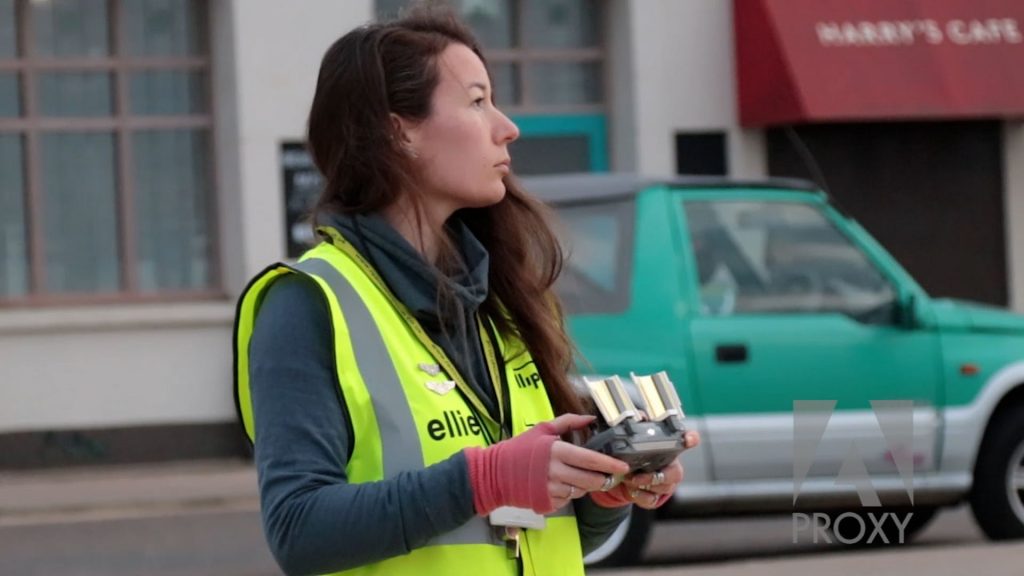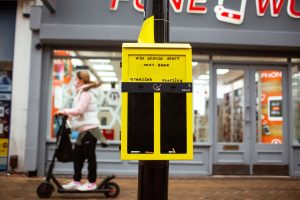
Ellie Mackay, Ellipsis Earth CEO, flying drone – photo: Ellipsis Earth
The most scientifically robust litter survey ever undertaken in the UK has revealed that positive, playful environmental messaging can cut litter and reduce plastic pollution. By creating bins that had positive, engaging messaging and strategically placing them in litter hotspots a 75% decrease in littering was achieved. In contrast negative and hectoring messaging increased littering by 10%.
The pioneering use of drone and AI technology was led by scientists at Ellipsis Earth. They undertook three sets of drone flights over Bournemouth, Christchurch and Poole creating a detailed map of every bit of litter dropped in the surveyed areas including beaches, town centres and green spaces. Surveys took place during the March lockdown, over the late May Bank Holiday weekend and finally during August Bank Holiday weekend.
The charity Hubbub used the data collected in May to implement a range of anti-littering campaigns built around proven behaviour change campaigns. In parallel the council ran their traditional communication campaign with more aggressive messaging. Results were measured by the August survey.
The interventions that proved most successful with residents and visitors in Bournemouth were the glow-in-the-dark bins, which saw an 88% reduction of glass bottle and aluminium cans littered in the vicinity, and ballot bins, where an average reduction of 73% of cigarette butts was recorded, when placed in targeted locations.
Other findings from the trial, revealed:
- The east side of Bournemouth Pier (where multiple interventions were placed) saw a reduction in litter of 79%. The west side (where no interventions were placed) had zero reduction
- Large brightly coloured bins helped reduce litter in Bournemouth Lower Gardens by 89% when they were brought in to supplement existing small closed bins which had previously been the worst performing bins in the region
- Ballot bins attached to lampposts (where people answer a question by depositing their cigarette end) placed in targeted locations showed an average reduction of 73% of cigarette butt litter
- All other existing council bins across Bournemouth and Poole showed no decrease in litter
- In Christchurch and in all the other beaches in the area where no interventions were put in place there was also no decrease.
Where negative and accusatory messaging was used, there was a 10% increase in litter in areas near this signage, suggesting that negative messaging doesn’t prompt positive behaviour.
The data also indicated that a fundamental change in strategy is required to cut plastic pollution reaching the sea. One of the largest forms of littering were small plastic fragments. Food outlets along the Bournemouth beachfront sell takeaway food in disposable polystyrene containers. Many are left on the beach to be pounced upon by seagulls searching for food scraps. The containers break into tiny plastic fragments which are blown or washed into the sea. This type of pollution would be ended if outlets were obliged to use reusable containers with a deposit repayable when returned. The solution exists but policy leadership by the council is required to make it happen.
The data illustrated that a surprising number of beach toys such as buckets, spades and inflatables were left littered on the beach. These are relatively cheap and can be cumbersome to carry so clearly some people think they are not worth the effort of removing. A solution might be to create a rental service for these items on the beach front. Not only could this cut littering it would also reduce the hassle of buying and lugging awkward items around which are only used infrequently.
Bournemouth rightly prides itself on world class beaches. The pristine sand is cleaned early every morning before visitors arrive. However, significant levels of litter are dropped in the late evening by people partying on the beach. Invariably this litter is washed into the sea before the early morning clean. Shifting cleaning routines to just before High Tide would prevent plastics reaching the sea. This is harder for the council to organise and potentially more expensive, but currently they are allowing the problems to be literally washed away.
Above everything, the campaign illustrated the significant value of high-quality data to inform decision-making. Based on the information provided councils could create more focussed litter prevention strategies, place bins where they are most needed, refine messaging in hot-spot areas, target resources more efficiently and work more closely to reduce littering.






Recent Comments